 |
|
 |
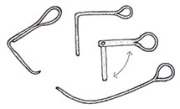 |
|
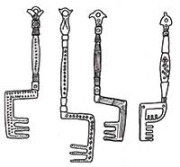 |
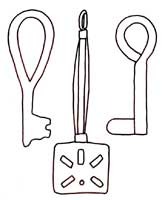 |
|
 |
 |
 |
 |
Drawings by Raine Borg, from his website Historical Locks.
 |
|
 |
 |
|
 |
 |
|
 |
 |
 |
 |
Drawings by Raine Borg, from his website Historical Locks.
While cautiously perusing the Huffington Post the other day, my morbid curiosity bested me: I clicked on a GE ad on the right of the page which had a faux-naive drawing of a cow on it. I proceeded to be accosted by an uber-cute, child-like animation of a day glow, up-beat, sultry-yet-approachable taking cow telling me that besides continuing to offer herself to me for food, she was now going to provide me with clean energy. According to this every-cow, the "geniuses" at GE found a way to turn her waste into "renewable" power.
They forgot to leave a section for feedback from me, the viewer — an oversight that seems endemic in the new-media advertisement age. Here's my response:
Dear GE,
I'd like to call your attention to a few factual errors in your advertisement.
- You did not discover trapped methane power. As you well kow, subsistence farmers, collectives, environmentalists and bio-engineers have been using and developing this technology for a century.
- Cows are not happy, or renewable. They require immense amounts of non-renewable resources, and your cartoon personification of such an unfortunate creature is perverse considering the objectification you are violently enacting upon living beings when you label them as renewable.
In short, I don't want your animal concentration camp energy. Your coinage and use here of the word "ecomagination" is a crime against the English language, not to mention any semblance of advertising ethics. You and whatever shit ad agency is responsible for this disgusting piece of work can kindly go fuck yourselves.
Sincerely, etc., etc.
Un/fortunately, I can't find that ad online now, but a quick and nauseating perusal of the Ecomagination YouTube channel has provided me with more lovely examples of the kind of advertising employed by large corporations when they know you'd have to be an idiot to believe what they are saying. First: treat the audience like a 5 year old. Second: create cartoon-like parodies of utopic worlds so absurd that they make even the most level-headed viewer question their grasp on reality. Perhaps the slight cultural distance from their Chinese ad campaigns can illustrate this even more effectively:
And while the Chinese audience is presumably swayed by industrial and technological visions of paradise, we Americans require that familiar stink of nostalgia to make us so confused we give up:
I hope Donovan feels like a total ass for selling them his song "Catch the Wind". (Is it possible that he was in fact thinking about trapped farts when he wrote it?)
We American consumers shouldn't be proud of GEs evident belief in our being more effectively stultified by saccharine pastoral landscapes, folk music and the dreams of children than our Chinese counterparts. GE has also wisely provided Americans with sufficient amounts of the cartoon mockery of our intellect — technique we arguably are responsible for imagineering:
This is of course just a minute bump on the landfill of big energy advertising pretending to pander to our concern for the environment while slapping us in the face with the complete absurdity of entrusting the fate of the planet to profit-seeking criminals who spend the other 98% of their time wreaking devastation. Nevertheless, I think it is important to attempt to convert some of this waste into useful thought.
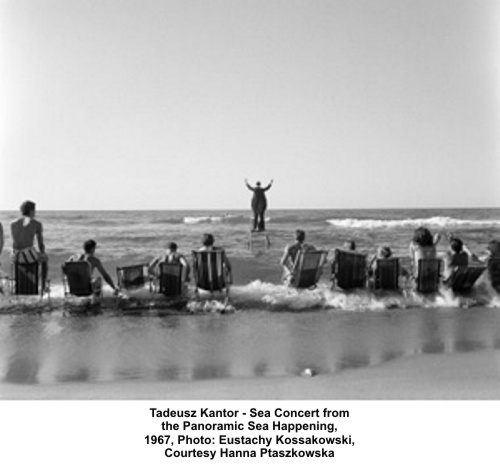
Tadeusz Kantor (6 April 1915 – 8 December 1990) was a Polish painter, assemblage artist, set designer and theatre director. His work and his writing about his work is what first sparked a real interest in theater for me, as well as an understanding that there are no limits to the transformative power of live performance.
I want to state openly that
this need to create theater
and visual arts
that would be d i f f e r e n t
from the reality of political terror and
of police vigilance
was grounded neither
in a moral obligation
to create
a R e s i s t a n c e M o v e m e n t ,
nor in feelings of p a t r i o t i s m ,
nor in the h e r o i s m of the underground movement.
I do believe that this process of
creating a d i f f e r e n t ,
o t h e r
reality whose freedom is not
bound by any laws of any system of life,
or the act itself, which is like a demiurge's act
or a dream
is the aim of art.
I keep stubbornly repeating this thought
because I am suspicious that
in the epoch of "the Springtime of the Masses,"
and of the fight for political and economic freedom,
this notion of
the biggest freedom
that is demanded by
a r t
will not be understood,
or will even be deemed unnecessary...
Freedom in art
is a gift neither from
the politicians
nor from the authorities.
Freedom exists inside us.
We have to fight for freedom
within ourselves,
in our most intimate interior,
in our solitude,
in our suffering.
— Tadeusz Kantor, 1990 (translated by Michal Kobialka)
Drop the I-Word is a campaign to expose the racist impacts of referring to immigrants as "illegals." This i-word is a damaging term that divides and dehumanizes communities and is used to discriminate against immigrants and people of color. The i-word is shorthand for illegal alien, illegal immigrant and other harmful racially charged terms. The campaign’s goal is to eliminate this terminology from popular usage and public discourse. Visit droptheiword.com to learn more and take the pledge.
Images taken from the free items section of Craigslist.
 |
 |
 |
 |
 |
 |
 |
 |
 |
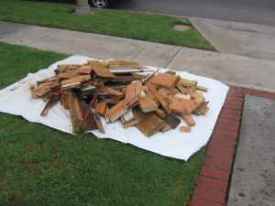 |
 |
 |
Olvera Street, Los Angeles, 10.29.10
A single shot I recorded of the procession on Olvera Street on 10/29/10.
I'm a year late, but I've finally found this and watched it — a few times. In this lecture — one of a series held annually in honor of Edward Said — Chomsky clearly contextualizes the Obama administration's foreign policy within the recorded and verified history of Imperialism. He lucidly displays the direct historical relationships between the Berlin Wall and the Wall of Annexation in Palestine, the genocide of Native Americans and all other genocides that have resulted from Western expansionism. This is not new ground for Chomsky, but it is as succinct and yet far reaching as any single talk of his I've heard, seen or read.
I cannot say that I find Chomsky's analysis entirely satisfying, but his scholarship and rhetorical precision are as always unreproachable. I have never found his theoretical assumptions or conclusions to be entirely coherent or providing an understanding of how Imperialist, racist and genocidal worldviews emerge or how they cohere with the philosophical, economic or wider cultural systems and situations in which they flourish and take root. Where I find a failure of imagination (empathy) arising from an automatic, inhuman conspiracy of intentional, human forces, he seems to only find a failure of a type of human being. Whether his ultimatum—to be either an Imperialist or a Libertarian—is a genuine existential condition he experiences or a rhetorical strategy aimed at instigating a crisis of the Imperialist imagination, I cannot say, but the scholarly and analytical tools he virtuostically demonstrates are of value to any emancipatory movement. I do not — I cannot — stomach the dismissal of his work by the Maoist and Sparticist intellectual left as lacking or even contradictory to dialectical materialist critique and revolution. His dedication to emancipatory theory, and his involvement in the real struggles of colonized, oppressed and dispossessed, in any honest estimation, puts the radical academic left to shame.
The dismissal or simple ignoring of his work in mass culture is not worth explaining — he himself has done it better than I or any one else could via the Propaganda Model. There is more to say there in terms of the human mind and imagination — as David Edwards and others have attempted to do — but I suspect that in careful analysis of this and other works of his, such levels of interpretation will be possible and fruitful for the indefinite period of struggle ahead. The ongoing dialogue between the ideas of Chomsky and Said is certainly one such avenue.
Marcel Duchamp was a French artist whose work is most often associated with the Dadaist and Surrealist movements. Duchamp's output influenced the development of post-World War I Western art. He advised modern art collectors, such as Peggy Guggenheim and other prominent figures, thereby helping to shape the tastes of Western art during this period.Duchamp’s first musical work, Erratum Musical, is a score for three voices derived from the chance procedure. During a New Year’s visit in Rouen in 1913, he composed this vocal piece with his two sisters, Yvonne and Magdeleine, both musicians. They randomly picked up twenty-five notes from a hat ranging from F below middle C up to high F. The notes then were recorded in the score according to the sequence of the drawing. The three vocal parts of Erratum Musical are marked in sequence as "Yvonne," "Magdeleine" and "Marcel." (Duchamp replaced the highest notes with the lower ones in order to make the piece singable for a male voice.) The words that accompanied the music were from a dictionary’s definition of "imprimer" - Faire une empreinte; marquer des traits; une figure sur une surface; imprimer un scau sur cire (To make an imprint; mark with lines; a figure on a surface; impress a seal in wax). Duchamp’s first musical work, Erratum Musical, is a score for three voices derived from the chance procedure. During a New Year’s visit in Rouen in 1913, he composed this vocal piece with his two sisters, Yvonne and Magdeleine, both musicians. They randomly picked up twenty-five notes from a hat ranging from F below middle C up to high F. The notes then were recorded in the score according to the sequence of the drawing. The three vocal parts of Erratum Musical are marked in sequence as "Yvonne," "Magdeleine" and "Marcel." (Duchamp replaced the highest notes with the lower ones in order to make the piece singable for a male voice.) The words that accompanied the music were from a dictionary’s definition of "imprimer" - Faire une empreinte; marquer des traits; une figure sur une surface; imprimer un scau sur cire (To make an imprint; mark with lines; a figure on a surface; impress a seal in wax).
Thea Musgrave is a Scottish composer of opera and classical music. Rich and powerful musical language and a strong sense of drama have made Scottish-American composer Thea Musgrave one of the most respected and exciting contemporary composers in the Western world. Her compositions were first performed under the auspices of the British Broadcasting Corporation and at the Edinburgh International Festival. As a result her works have been widely performed in Britain, Europe and the USA, and at the major music festivals, such as Edinburgh, Warsaw Autumn, Florence Maggio Musicale, Venice Biennale, Aldeburgh, Cheltenham and Zagreb; on most of the European and American broadcasting stations; and on many regular symphony concert series. "Black Tambourine", on six poems of Hart Crane, is performed as a continuous 18 minute span. The cycle captures the wide range of moods of the poetry, from the madrigal-like trio of ‘Pastoral' to the tinkling salon piano of "My Grandmother's Love Letters".
Camberwell Now were formed in London in 1982 after the demise of This Heat featuring one of the founders of that group, drummer and vocalist Charles Hayward, bassist and vocalist Trefor Goronwy, who had joined This Heat to replace Gareth Williams after the latter had quit the band, and This Heat's former sound technician Stephen Rickard, who brought the studio to the stage with the revolutionary and possibly unique "tape switchboard". In all, the band released one album, The Ghost Trade, two 12" EPs, MeridianGreenfingers, two tracks for the Sub Rosa Myths/Instructions album and a track for the Touch audio cassette/magazine. Most of this material was later reissued in CD form as All's Well by RecRec Music in 1992, and this compilation was remastered and reissued in November 2006 by ReR Megacorp.
June of 44 is s an American rock band which was formed in 1994 from ex-members of Rodan, Lungfish, Rex, and Hoover. The band's music is often described as 'math rock'. The band's name refers to June Miller, wife of author Henry Miller. The band toured extensively and reached as far as Australia. Often referred to as the punk rock pirates of the math rock world, June of 44 were a collective from 1994–2000. All the members were living in different cities at the time. Often cited for their artistic hand crafted record packaging, June of 44 had six releases in as many years before members went on to form HiM, The Sonora Pine, Shipping News and Rachel's. This seminal band created music that ranged from experimental jazz to ambient dub to angular post punk.
A Minor Forest was a San Francisco-based math rock band in the 1990s. They were musically related to the Louisville scene of post rock groups like Slint and had personal connections to the San Diego scene of Three Mile Pilot and related bands. Their songs had pop music, progressive rock, and punk rock influences and featured changing time signatures, sudden dynamic changes, silent pauses, unintelligible screaming, catchy, repeating melodic passages and absurd, in-joke titles. Their slogan was "A Minor Forest Supports the Destruction of Mankind." They formed in San Francisco in 1992 and, in addition to other smaller releases, put out three albums: Flemish Altruism (1996) and Inindependence (1998) on Chicago label Thrill Jockey, and So, Were They in Some Sort of Fight? (1999), a career-spanning compilation on My Pal God records. They played their last show on November 1, 1998 at Great American Music Hall in San Francisco.
The Swords Project was formed in late 1999 in Portland, Oregon. Under this moniker, they released an ep, 2001’s The Swords Project, which was followed two years later by their only full-length album, Entertainment Is Over If You Want It. In 2003, the band shortened their name to Swords. In 2006, the band announced they would be breaking up.
A quotidian scene from a parking lot in Los Angeles. A test of the macro capabilities of the iPhone 4 video camera.
A quotidian scene from a parking lot in Los Angeles. A test of the macro capabilities of the iPhone 4 video camera.
by Gonzalo Escobar (2008)
Winged performers in the streets, armed with water sprays bottles, become a metaphor to the relationship between a Colombian filmmaker living in the United States and the aerial fumigations of coca crops occurring in his native country. Different perspectives of the topic are explored through images and sounds, but especially, through his opportunity to travel to southern Colombia, where the fumigations have been taking place. Aspects of documentary filmmaking are mixed with elements of the film essay genre. Animation, news, and found footage also take part of this visual and sonic collage that thrives to represent the filmmaker’s position and to some extent, the position of any viewer. 2017 www.cinescuela.org 2011 Coloquio Ensamblando a Colombia, Naturalezas, Culturas y Tecnologías. UNAL, (Bogotá, Colombia) 2011 Exposición Ensamblando Representaciones: Ciencia y Tecnología en situaciones de conflicto social: Cultivos ilícitos y glifosato, Maloka (Bogotá, Colombia). 2009 CineSul (Rio de Janeiro, Brazil) 2009 True/False Film Festival (Missouri, USA.) 2009 Videoteca del Sur (New York, USA) 2009 CAN TV, SAIC Experimental TV Series (Chicago, USA). 2008 Time Arts Student Exhibition, Gene Siskel Film Center (Chicago, USA). 2008 “The New Newness”, Nightingale Theater (Chicago, USA). 2008 Out of Time Festival (Skien, Norway).
From Gonzalo Escobar's Vimeo page:
Winged performers in the streets, armed with water sprays bottles, become a metaphor to the relationship between a Colombian filmmaker living in the United States and the aerial fumigations of coca crops occurring in his native country. Different perspectives of the topic are explored through images and sounds, but especially, through his opportunity to travel to southern Colombia, where the fumigations have been taking place. Aspects of documentary filmmaking are mixed with elements of the film essay genre. Animation, news, and found footage also take part of this visual and sonic collage that thrives to represent the filmmaker’s position and to some extent, the position of any viewer.
Gonzalo is the lead performer in my film Oh My Soul, and a good friend. This video taught me a lot about the issue of crop fumigation in Colombia as well as strategies for investigating the social and political through personal filmmaking. I hope he makes more soon!


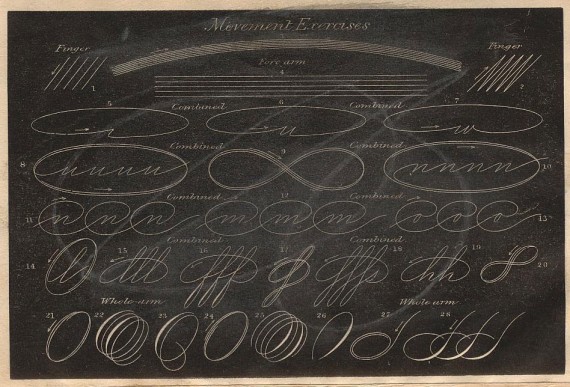
IAMPETH (the International Association of Master Penmen, Engrossers and Teachers of Handwriting), which describes itself as "an international, non-profit association dedicated to practicing and preserving the beautiful arts of calligraphy, engrossing and fine penmanship," has an absolutely wonderful, treasure-trove of a website at www.iampeth.com.
Highlights of the IAMPETH's website include the gallery of Master Penmen from the Golden Age of Ornamental Penmanship (replete with biographies and work samples), but by far the greatest thing this site has to offer is a PDF library of dozens of scanned, downloadable rare books filled with beautiful calligraphic designs.

Tibetan Buddha statue made of brass (15th century). Photograph and a neutron radiogram. The radiogram reveals wooden objects and dried flowers hidden inside the statue. Neutrons easily pass through metals and reveal substances containing hydrogen. (Paul Scherrer Institut)
The Epley maneuver:
The Brandt-Daroff maneuver:
From ehow.com:
Vertigo is a disorder of the middle ear, caused by small crystals that have colonized in a sensitive part of the inner ear. These crystals become displaced, causing the dizziness of vertigo. Usually a physician who specializes in dizziness and balance disorders will perform The Epley or Semont maneuver to help settle the displaced crystals. The Semont maneuver is a calculated and rapid moving exercise, performed only by a doctor in the safety of a doctor's office. Brandt-Daroff exercises are similar to the Epley maneuver, but they can be done at home. These exercises can benefit anyone with dizziness, vertigo, imbalance, lightheadedness or faintness. They are safe and easy to perform.
The Ishihara color test is a test for color blindness. It was named after its designer, Dr. Shinobu Ishihara (1879-1963), a professor at the University of Tokyo, who first published his tests in 1917. It makes use of the peculiarity that in red-green blindness, blue and yellow appear remarkably bright compared to red and green.
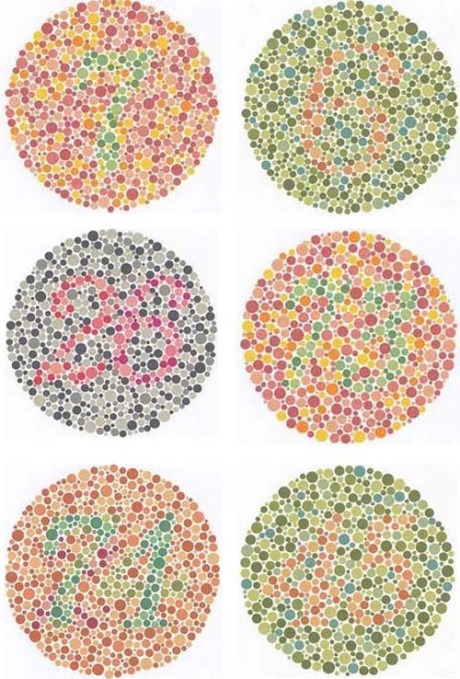
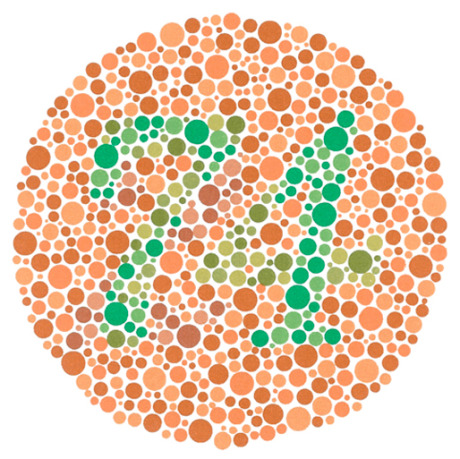

Le roman de renard (or The Tale of the Fox) By LADISLAS STAREVITCH — 1930
(from Wikipedia:)
In the kingdom of animals, the fox Renard is used to tricking and fooling everyone. Consequently, the King (a lion), receives more and more complaints. Finally, he orders Renard to be arrested and brought before the throne.
This is the legendary feature film by Wladyslaw Starewicz (or Ladislas Starevitch, or Ladislas Starewicz, or Ladislaw Starewicz, or Ladislas Starewitch, or Ladislaw Starewitsch). It is also his only one, and he directed it with his wife, Irène Starewicz. The story is an adaptation of a compilation or medieval French legends called "Le roman de renart". It's an entertaining story, a social satire, but most of all a landmark in early animation. I find the stop-motion truly remarkable, even by Starewicz's standards. The facial expressions and the movements are very smooth and fluid.
It had a good reception when it was first released, but as it was wartime people quickly forgot about it. They later exploited in under the form of shorts, since it contains many independent stories with one linking narrative.

IF YOU STAND IN FRONT OF A LAKE YOU HAVE THE HORIZON AND YOU HAVE THE SHAPES ABOVE AND THE SHAPES REFLECTED IN THE WATER IF THE AREA BELOW THE HORIZON IS JUST REALITY REFLECTED IN THE WATER
— Louise Bourgeois

Greenpeace worker Lindsey Allen walks past a pool of oil as she collects samples of oil that washed up along the mouth of the Mississippi River south of Venice, La. Wednesday, May 19, 2010. Oil from last month's Deepwater Horizon oil rig explosion in the Gulf of Mexico has started drifting ashore along the Louisiana coast. (AP Photo/Charlie Riedel)
*****
What constitutes a "crime against humanity"? When is an "ecological crime"? not a crime against humanity? These are questions I ask myself when attempting to understand the gravity and consequences of the ongoing Deep Horizon disaster in the Gulf of Mexico, because I am stunned by the absence of discussion of criminal liability for the responsible parties. I know that part of this silence is generated by a lack of established legal frameworks for determining criminal liability in such cases, let alone in actually holding trials and executing judgements.
For those who are curious, like me, crimes against humanity, as defined by the Rome Statute of the International Criminal Court Explanatory Memorandum,
are particularly odious offences in that they constitute a serious attack on human dignity or grave humiliation or a degradation of one or more human beings. They are not isolated or sporadic events, but are part either of a government policy (although the perpetrators need not identify themselves with this policy) or of a wide practice of atrocities tolerated or condoned by a government or a de facto authority. Murder; extermination; torture; rape and political, racial, or religious persecution and other inhumane acts reach the threshold of crimes against humanity only if they are part of a widespread or systematic practice. Isolated inhumane acts of this nature may constitute grave infringements of human rights, or depending on the circumstances, war crimes, but may fall short of falling into the category of crimes under discussion.
The Rome Statute has one paragraph that refers to environmental damages as war crimes: Article 8(2)(b)(iv):
Intentionally launching an attack in the knowledge that such attack will cause incidental loss of life or injury to civilians or damage to civilian objects or widespread, long-term and severe damage to the natural environment which would be clearly excessive in relation to the concrete and direct overall military advantage anticipated;
In a 2001 U.S Army Environmental Policy Report, the authors state that
There are three ways a case may come before the Court: referral by a State Party to the Statute; referral by the UN Security Council; or initiation of an investigation by the Prosecutor of the ICC.
For the court to have jurisdiction, several stringent conditions must be met. The act must be:
- Among “the most serious crimes of concern to the international community as a whole” (Preamble, par. 4, Doc. UN/A/CONF.183/9, 17 July 1998;
- The result of an attack specifically intended to create that damage; “collateral” damage would not come under the Court’s jurisdiction (in the words of one of the interviewees, the Statute “is about war crimes, not mistakes”);
- Launched with the knowledge that it would cause “long-term and severe damage to the natural environment” which would be “clearly excessive” to anticipated military gains; and
- If the above three conditions were met, the principle of “complementarity” would come into play. The ICC will complement national procedures, not replace them. If a country has legal mechanisms to address the crime, and they are functioning properly, the ICC would not have jurisdiction.
- All cases are filtered by a three-judge panel. If a series of frivolous cases flooded the court, they would not pass the panel.
Apparently, many suggestions have been made for the establishment of a specific statute and category for "Enviromental Crimes" to address those most aggregious actions which occurr outside of wartime and whose victims are not considered to be immediately "human". For instance, Mary Clifford proposed a definition of environmental crime in her 1998 book Environmental Crime, as
- A broad philosophical definition: An environmental crime is an act committed with the intent to harm or with a potential to cause harm to ecological and/or biological systems and for the purpose of securing business or personal advantage.
- A practitioners’ definition for a legal framework: An environmental crime is any act that violates an environmental protection statute.
Here's the problem: the rigid distinction between crimes against humanity and environmental crimes (and the relative devaluation of the seriousness of the latter) is absurd. Environments are — in a very tangible and real way — part of what constitutes "humanity" in an individual or group of individuals, and must be considered as such in the constitution of the legal subject. There are established legal dialogues and formulations of the environmental component of cultures (they exist, although they too are still underdeveloped and underrecognized) and yet when it comes to the conception of the "humanity" which is a victim of "crimes against humanity", the undeniable connections of the well-being of human with non-human species, geological and weather conditions with human populations, are ignored — or rather, left out because of their extreme unpopularity with status quo financial and economic international bodies. Is there anybody who lives anywhere near the gulf region who does not feel that the current Deep Horizon disaster constitutes "a serious attack on human dignity or grave humiliation or a degradation"? Is it not abundantly clear that vast numbers of people who live near coastlines that are being developed for off-shore drilling, oil refining and other potentially disastrous scenarios feel that their environmental rights are being degraded?

Despite the fact that environmental protection laws are often put on the books because of their seriousness and the potential effects on humans as well as natural environments and animals — including death in many cases — and despite the fact that it is possible and not uncommon for companies and governments to be held criminally responsible for injuries and deaths of individuals through their infringement of environmental protection laws — there is a massive disconnect between the specific case to the general or systemic which prevents the recognition of the severity and international character of systemic instances of massive environmental damage.
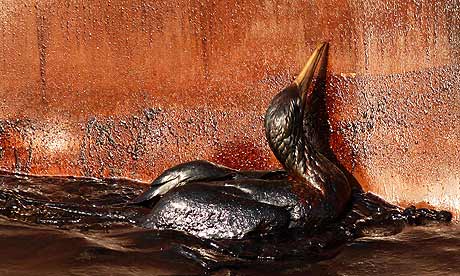
It is true that there are more complicated determinations to be made than others — the factors in determining the parties responsible in climate change and proving their criminality is a massive project (although by no means impossible). But the oil spill in the Gulf is as black and white as they come, if only you actually hold to the letter of the law. Officials within the Obama administration (previous administrations are not exempt, merely not of immediate concern), the EPA, the MMA British Petroleum, Halliburton, Transocean, Chevron, ExxonMobil and other institutions are — without a doubt — guilty of crimes against humanity.

The president and his administration continue to tolerate and condone the systemic practices of massive environmental degradation which kills and injures humans and environments alike. I agree that boycotting BP and other companies makes sense for concerned individuals looking for ways to make a posititve difference in the course of their daily lives. I agree that voting against policies and politicians who support these practices makes sense in the short term. Unfortunately, this is not enough. According to the Institute for Southern Studies, the immediate-to-near term fluctuations in brand loyalty and party politics do not threaten entrenched off-shore oil enonomics:
While the short-term picture for offshore drilling is cloudy, there are few signs that the energy industry intends to move away from offshore drilling -- including deepwater exploration, like that which the Deepwater Horizon rig was conducting before its fateful April 20 explosion.
That's because the offshore drilling industry operates on a different, longer-term cycle than politics. Due to the immense cost and scale of offshore drilling projects, the companies involved operate on multi-year plans and leases, which they have no intention of abandoning after one disaster, even if it is the biggest oil spill in history.
In the short-run, the energy industry is bracing for a series of setbacks: lawsuits, regulations, even temporary drilling bans. For example, on Monday, the Obama administration revealed the details of a six-month moratorium on deepwater drilling (defined as deeper than 500 feet), including some 30 exploratory wells.
But six months is a short time horizon for deepwater offshore drilling projects, which take years to get off the ground. With shallow water drilling showing diminishing returns, the major oil companies view deepwater drilling a fixed part of their future: Deepwater rigs capable of drilling 3,000 or more have increased 43% since 2006.
It is long past the time to consider the implications of not addressing the systemic practices that threaten, harm and kill humans and their environments — not only in protests, boycotts, direct action and democratic referendums — but in the theory and practice of international law.